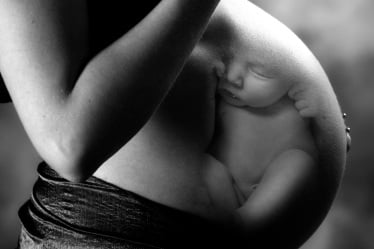Pregnancy hormones bring about changes to almost every part of your body, both externally and internally.

Changes in the Internal Organs [Illustration by Shinod AP]
An average uterus measures seven centimetres in length, five centimetres in width and is over two centimetres thick. At full term, it can measure as much as 38 centimetres in length, 25 centimetres in width and 20 centimetres from front to back. Its weight increases about 20 times its size.
The uterus grows slowly and remains inside the pelvis till about the 12th week. Then it enlarges slowly to reach the navel by the 22nd week. And by the 30th week, it reaches the lower chest. Around the same time, the baby’s head descends into the pelvic cavity and the level of the uterus drops slowly. The baby continues to grow upto the 40th week so the level of the uterus may go up again upto the lower chest.
Uterine Contractions
Throughout pregnancy, you will feel a hardening of the uterine wall every now and then. This feeling is due to contractions in your uterus to help it grow. They are largely painless and occur every 20 minutes for about 20 seconds.
The contractions during labour also feel like your uterine wall is hardening, but it is accompanied by pain, which gradually travels from the back to the front.
Ovaries
The ovaries producing the ova is called ovulation. When the ova gets fertilised, the fallopian tubes transport it to the cavity of the uterus. At the same time, the ovaries produce the hormone progesterone, which maintains the pregnancy until the placenta takes over the job between the 12th and the 14th week of pregnancy.
The ovaries enlarge during pregnancy and may occasionally develop small cysts, which is quite normal. Both the ovaries return to their normal size and shape and the cysts disappear before childbirth.
Vagina
During pregnancy, the colour of the vagina changes from pale pink to dark pink or even pale blue and vaginal secretion increases to a certain extent. If you have a lot of white discharge, which has an offensive odour, feel any pain or irritation in the vaginal area, consult your gynaecologist.
Urinary Bladder
You may urinate frequently throughout your term. This is because the uterus presses onto the wall of the urinary bladder.
Blood Pressure
Your blood pressure is likely to fall during early pregnancy as the hormone progesterone reduces blood circulation. This could lead to fainting spells or a feeling of giddiness — a common symptom in pregnancy.
As the pregnancy advances, the blood volume increases leading to an increase in normal blood pressure levels.
Blood Volume
The amount of blood that circulates in a woman’s body of average height and weight is 5 litres. During pregnancy, the blood volume will increase by 30-40 percent between the 10th and 34th week and will remain constant thereafter.
As soon as the hormone levels fall after childbirth, the blood volume will return to normal.
Pelvis
Most of the ligaments in the body soften during pregnancy, especially those in the front and back of the pelvis. They become more elastic to increase the capacity of the pelvis for easy passage of the baby.
The Nervous System
Certain emotional changes and even variations in personality are evident soon after conception and may continue until six months after childbirth. But no fundamental changes occur in the central nervous system.
As pregnancy advances into the last eight weeks, the baby’s head may bounce on the nerves in the brim of the pelvis, resulting in shooting pains down the front or the back of the legs.
The Heart
The heart gets enlarged and increases its amount of work by at least 40 percent with only a slight increase in heart rate and no change in rhythm. It returns to its normal shape, size and position within three or four days after labour.
Lungs
The lungs have to over work during the last four months. The enlarging uterus pushes up the diaphragm and squeezes the lungs into a smaller area within the chest cavity, thus making breathing difficult. The lungs return to normal almost immediately after delivery.










